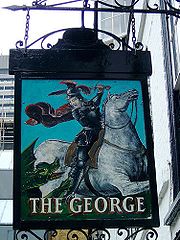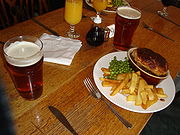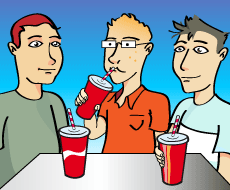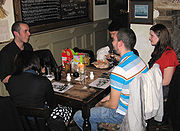4. Alex and Andrés weren't enjoying Paco's journey
Paco's journey was about to begin. Alex and Andrés weren't enjoying with this but they were assimilating it little by little. Paco wasn't watching TV when the telephone rang. He was looking for some compact discs for the travel. He didn't take too many CDs because he intended to buy some of them during his trip. His friends called him to go for a drink and to say goodbye to Paco.
|
|
| Example: | He __________ (go) to the party. |
|
He wasn't going to the party.
|
| 1. | Harry (watch) TV at 8 pm last night. He was studying. |
| 2. | Jill (wear) her uniform at work yesterday. |
| 3. | They (cook) dinner when I arrived. |
| 4. | We (carry) an umbrella when it started to rain. |
| 5. | She (listen) to her teacher when he asked a question. |
| 6. | It (rain) while we were playing tennis this morning. |
| 7. | Greg (study) when we went to his place. |
| 8. | You (play) cards when he rang. |
| 9. | They (have) a good time at the party when they decided to go home. |
| 10. | Anna (eat) dinner when we arrived. |
1. Paco about the travel all the time (to think)
2. Alex and Andrés Paco with the luggage (to help)
3. Paco's father the newspaper in the kitchen (to read)
4. The neighbours any party for Paco (to hold)
5. Sonia on the phone with her friend (to speak)
A public house, informally known as a pub, is a drinking establishment licensed to serve alcoholic drinks for consumption on the premises in countries and regions of British influence. Although the terms often have different connotations, there is little definitive difference between pubs, bars, inns, taverns and lounges where alcohol is served commercially. A pub that offers lodging may be called an inn or (more recently) hotel in the UK. Today many pubs in the UK, Canada and Australia with the word "inn" or "hotel" in their name no longer offer accommodation, or in some cases have never done so. Some pubs bear the name of "hotel" because they are in countries where stringent anti-drinking laws were once in force. In Scotland until 1976, only hotels could serve alcohol on Sundays.
|
|
 |
 |
| By Arpingstone. Public Domain | By Nickfraser. GNU license |
By Xyrael. GNU license |
There are approximately 57,500 public houses in the United Kingdom, with at least one in almost every city, town and village. In many places, especially in villages, a pub can be the focal point of the community, so there is concern that more pubs are closing down than new ones opening.
Text adapted from Wikipedia.
For explanations about use and form of the Past Continuous, click here.
If you want to practice doing negative sentences in Past Progressive, have a look here.
Another good exercise for negations in Past Progressive. Have a look.

